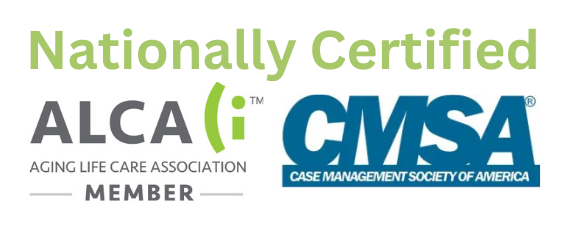Research shows that 68 percent of people age 65 and over are disabled, cognitively impaired, or frail enough to require eldercare. This includes not only medical care, comfort care, and supervision, but also assistance with such day-to-day activities as preparing meals, cleaning, shopping, transportation, paying bills, scheduling and getting to doctor appointments, and even answering incoming phone calls.
These needs often arise due to cognitive impairment resulting from stroke, Alzheimer’s disease, dementia, depression, or Parkinson’s disease, among others. More often than not, the required support is provided by family members. This can be a tremendous load to bear, as the needs can be constant, and tend to increase over time as the effects of a cognitive, or physical disability increase with age.
Care Managers, also known as Geriatric Care Managers or Specialists, Aging Life Care Experts, or Eldercare Managers, can help to relieve the pressure on family members who may be feeling overwhelmed by the responsibilities thrust upon them as the condition of a disabled or senior loved one deteriorates over time.
They can help navigate the labyrinth of care options and protocols, as they are experienced in these matters, whereas a family member may be entering this space for the first time.
Underutilized Senior Care Management Service
Geriatric care management services are often overlooked by families. Those with long-term care insurance can expect financial support for covering these costs, though most will have to pay out-of-pocket.
When a person is experiencing legal problems or tax issues, they understand that retaining the services of an attorney or CPA will be the most efficient, and therefore the most cost-effective way to manage those issues. Similarly, depending on the severity of the issues, enlisting the services of a senior care management specialist may be the most efficient option by offsetting the costly time-consumption requirements of attempting to go it alone.
Specialization Within the Elder Care Management Field
As with any major decision related to the health and well-being of the family and its members, it’s important to identify the care management team or individual whose skillset best lines up with your needs.
Since every family’s and individual care recipient’s needs are different, take a look at the backgrounds and specialties of various elder care providers to help you decide which is the best fit.
For example, it’s generally understood that a need for medical-related care will be required. But what other needs may arise? Could there be family disputes surrounding the situation? In this case, a provider with a background in mediation may be the right fit. If there is a mental-health component, it’s critical to find somebody experienced in this area.
Many geriatric care managers have diverse backgrounds in nursing, social work, counseling, physical therapy, financial management, and other related sectors. It’s always a good idea to identify these skills during the interview process.
Services Provided by Geriatric Care Managers
The list of services provided by any specific care management firm varies widely, depending on the backgrounds and areas of specialization on which they may focus.
However, there are many services broadly offered within the sector. These may include evaluating care needs, developing a short and long-term plan to meet these needs, and initiating and maintaining this plan. Case managers are also charged with ensuring that the care being provided is safe, thorough, and in line with the limitations of the recipient.
Elder care managers assist with family-related issues surrounding the situation, so they may get involved with conflict resolution among family members surrounding the care plan. They may also advocate for in-family caregivers who will remain involved in the care plan or communicate regularly with out-of-town family members who wish to remain in the loop.
These individuals and teams are huge assets when it comes to placement in care facilities, as well as ongoing oversight of both in-home and in-facility care. They assist with arrangement of legal or financial services, with Medicaid applications and qualification. They will coordinate medical information and appointments, including transportation, and manage medications.
Additionally, elder care managers may also assist family members in positive decision-making, to identify crisis-avoidance solutions, and develop long-term plans for those family members who may not currently need such services, but are likely to in the not-too-distant future.
Families and the seniors in their care often desire in-home care and wish to remain at home as long as possible. Geriatric care managers facilitate this and often make it possible, where it might not otherwise be.
Family members may find it difficult to decide when it’s time to move their loved one to a care facility. Geriatric care managers can assist with this difficult decision by applying their experience and maintaining an unbiased perspective to identify the decision that’s most beneficial to the patient.
The list of peripheral services goes on and on. Taking advantage of them is something every family finding itself with a need for higher-level care should consider.
If you would like to speak to one of our Senior Care Managers, please contact us today.







